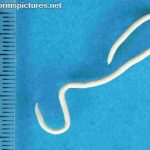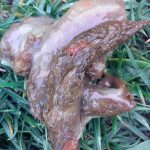Originally published Oct. 26, 2017

Talking about your canine friends excrement may not be a glamorous topic, but there are some things that all dog owners should be aware of and watching for. Yes, that’s right: you need to be looking at your dog’s poop.
Why Examine Your Dog’s Poop
With dogs, as with people, what is excreted can give clues to problems that are building inside. Watching for signs of trouble as you clean up after your dog can give you warning well before severe symptoms set in. Here’s what to look for:
NOTE: To be as effective as possible I have included photos. To be as inoffensive as possible, I have made the on-page photos very small. Click the photos to view them full size — or skip that if you’re squeamish.
Worm-sign
Intestinal parasites (worms) cause malnutrition, vomiting, diarrhea, and anemia. Besides making your dog sick, some of these parasites can affect people as well.
Intestinal worms are rarely seen because they live inside the intestinal tract and pass microscopic eggs or spores in your pet’s stool that are too small to be seen by the naked eye. Some of these can live on in the soil of your yard even after your dog’s poop has been picked up. These can infect other dogs and possibly your children. To be sure your dog has no intestinal parasites, have your vet test your dog’s stool at his annual health check.

Tapeworms are one exception to the “never seen” thought: they shed segments that resemble sesame seeds or grains of rice and are typically seen in your pet’s stool or around their rectum.  Roundworms are another exception since, if infested, they are seen in your pet’s vomit or stool. Worms generally do not cause symptoms in your dog until the infestation is pretty bad. These signs include:
Roundworms are another exception since, if infested, they are seen in your pet’s vomit or stool. Worms generally do not cause symptoms in your dog until the infestation is pretty bad. These signs include:
- Scooting
- Vomiting
- Diarrhea
- A distended abdomen
- Weight loss
- Coughing
All of these signs can have other causes. To be sure, have your veterinarian examine your dog and perform fecal testing.
Blood
Blood can show up in your dog’s poop in two ways: one is as obvious, red blood. The other is as a black, tar-like dog poop.
If the blood is red and outside the stool the problem is most likely in the colon or rectum, like an enlarged prostate, an obstruction or a cut on the anus, worms, or infected anal glands. This condition of fresh red blood on the stool is known as hematochezia. A single, small instance can also be caused by something the dog ate or by dragging her butt on something abrasive. This would not warrant an emergency trip to the vet. Repeated signs of hematochezia or a large amount of fresh blood in the stool should be addressed by your veterinarian. Bring a stool sample when visiting the vet to help determine the cause.
If your dog is a puppy and has bloody diarrhea, this can indicate infection by parvovirus. Call your vet immediately. If you have other dogs, quarantine them separately, for Paro is deadly and highly infectious. Wash your hands with disinfectant when going from one dog to the next. Adult dogs who are current on their immunizations are protected from parvovirus. If you skipped the annual shots or elected to go with just the mandatory rabies shot, your dog is susceptible to parvovirus regardless of age.
If your dog’s poop is black and tarry, this is called melena and is a sign of serious problems in the stomach or small intestine. The blood is black because it’s gone through the digestion process. Dogs should be brought to the veterinarian immediately if black, tarry stools are seen.
Mucus or Grease
 Your dog’s intestines produce mucous as a lubricant and to protect against bacteria. Seeing occasional, small amounts of mucous clinging to your dog’s poop is not cause for alarm. A change in diet or dietary indiscretion can cause this. Seeing large amounts or seeing it often may be. If the mucous is accompanied by diarrhea, it may indicate Colitis. If it persists see your vet.
Your dog’s intestines produce mucous as a lubricant and to protect against bacteria. Seeing occasional, small amounts of mucous clinging to your dog’s poop is not cause for alarm. A change in diet or dietary indiscretion can cause this. Seeing large amounts or seeing it often may be. If the mucous is accompanied by diarrhea, it may indicate Colitis. If it persists see your vet.
Greasy yellow stools can indicate too much fat in the diet (which can lead to pancreatitis) or an enzyme deficiency. If this persists more than a day or two, see your vet: do it quickly.
Extreme Odoriferousness
Dog poop normally does not smell nice. But if it gets really, really offensive all of a sudden take special note. If it’s just for a single instance or two, it was probably something she ate. As long as this goes away, she fine. If it continues, there may be a serious problem in her gut and you should get her to your vet for an exam.
Special note: Some dogs will pass gas that will clear a room, but their poops don’t stink like that. That may be normal for that dog. You can consult your vet, but probably can wait until your next scheduled check-up. There are products available to reduce the amount of gas a dog produces. Changing their diet can also help.
Diets that contain highly digestible protein and carbohydrates with low quantities of fat are preferred for reducing flatulence. Diets containing cruciferous vegetables like broccoli, cabbage, cauliflower, and Brussels sprouts should be avoided with the flatulent dog.
Constipation / Diarrhea
If your dog suddenly has to strain to eliminate, or develops diarrhea, these can be caused by a change in diet — both what you feed the dog and what he eats without your consent. Raiding a trash can or a hunting expedition in the yard can produce a change in your dog’s poop. Relief for both conditions can be found in canned or fresh pumpkin or squash. Most dogs find these delicious and because they are high in fiber will promote regularity. For medium sized dogs (40-60 pounds) 1/4 cup of this added to their regular food (assuming twice a day feeding) will get them through their irregularity in 1 to 3 days. If it goes beyond that, see your vet.
Now that that’s out…
There you have it: a run-down of common issues with your dog’s poop, what causes them, and what you can do about them. I hope you’ve found this enlightening (and not too gross). If you’d care to comment, or add anything, feel free to use the comments thingie below. It’s free and easy to do. Thanks for stopping in!
RESOURCES:
In case you have an insatiable desire for more on this topic:
- http://www.pethealthnetwork.com/dog-health/dog-diseases-conditions-a-z/intestinal-parasites-dogs
- http://dogwormspictures.net/
- http://pets.webmd.com/dogs/parvo-parvovirus-dogs#1
- https://www.dogsupsetstomach.com/mucus-in-dog-stool/
- http://www.petmd.com/blogs/thedailyvet/ktudor/2012/nov/managing_flatulence_in_dogs-29443
- https://www.vetinfo.com/dog-parasites-transmitted-to-humans.html
| If you enjoy our updates, Doggy Tales, and educational articles consider subscribing for notices when new pieces are posted. It’s painless and you can unsubscribe any time you want. Your e-mail address is used ONLY to deliver these notices. | [email-subscribers namefield=”YES” desc=”” group=”Public”] |




You have no idea how much this article helps. I worry about my dog and tend to panic with the smallest changes. Knowing what to look out for certainly helps, so thank you.